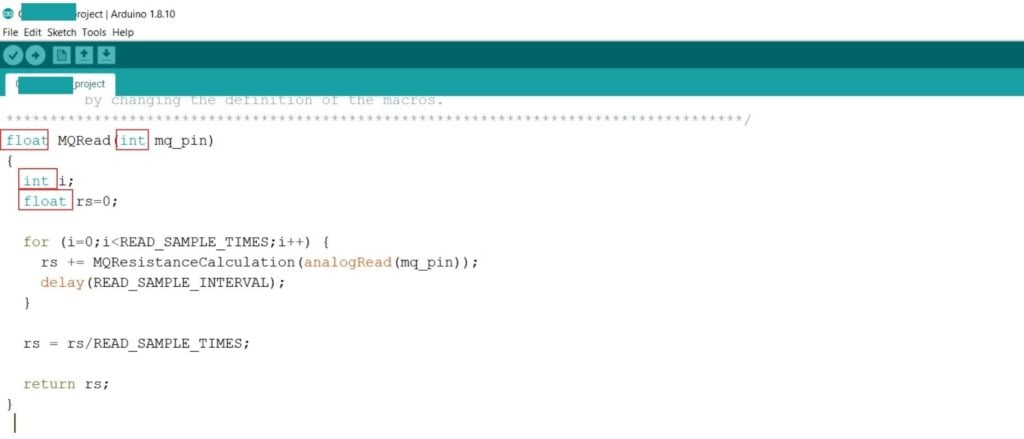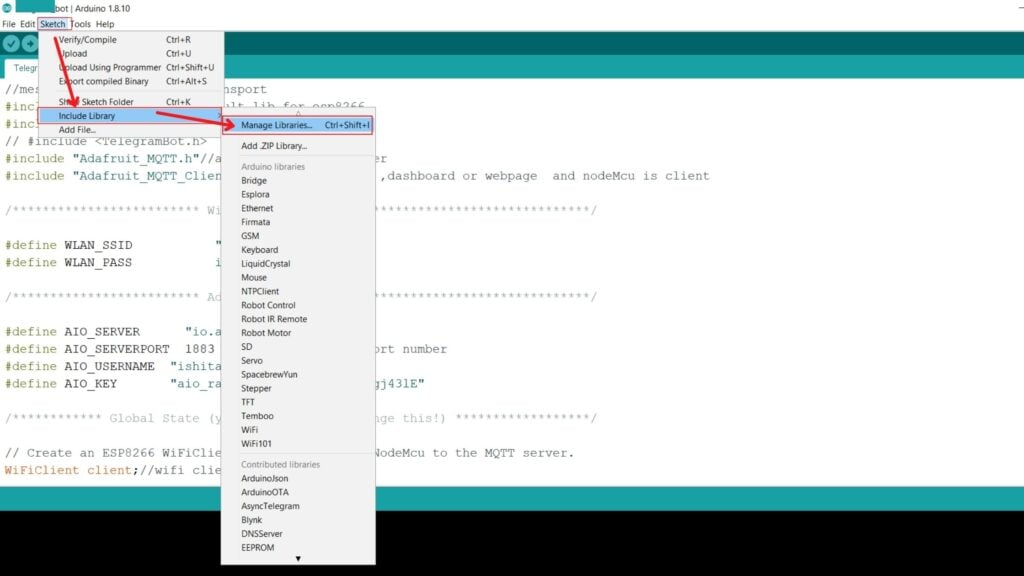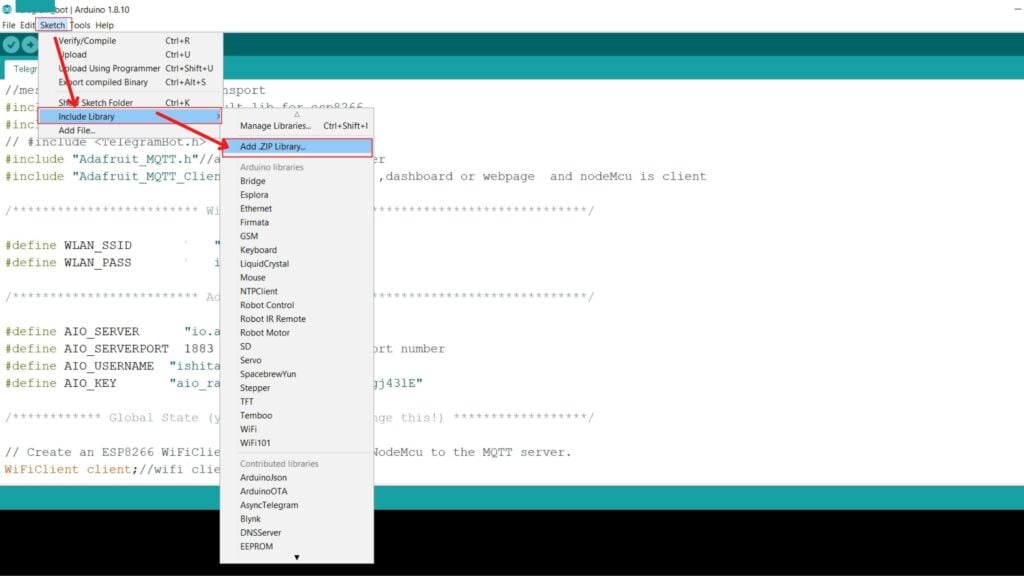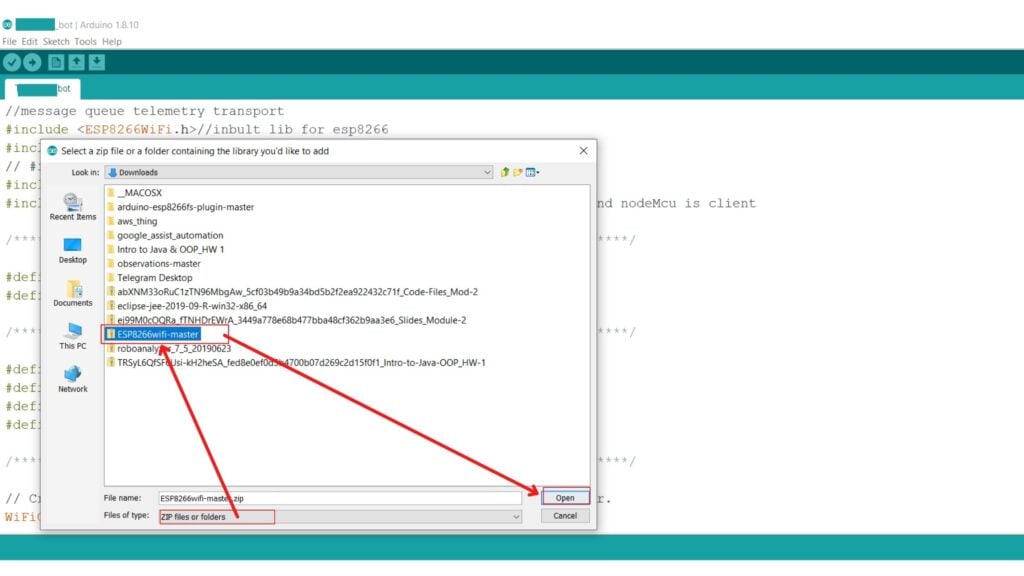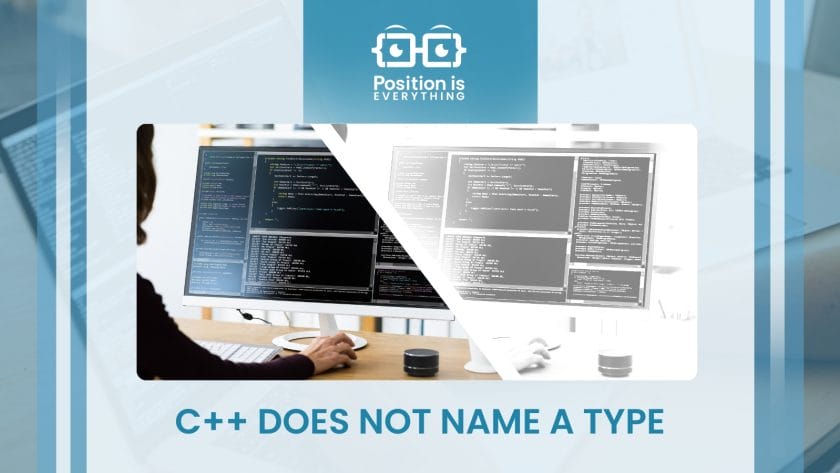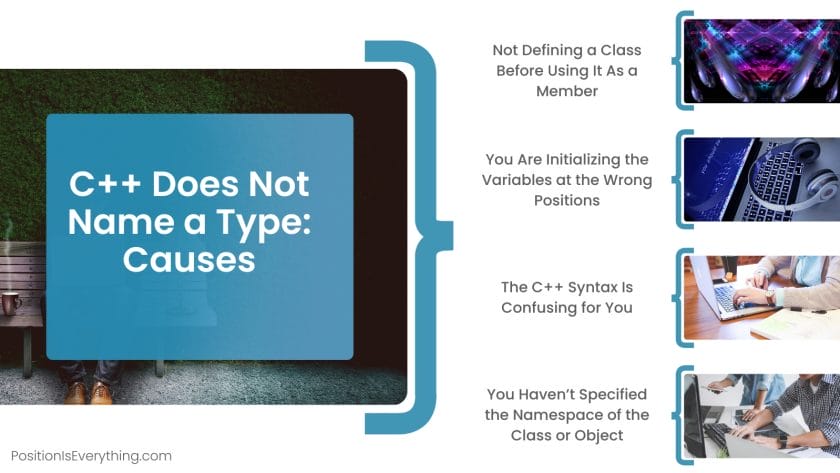When the compiler compiles the class User and gets to the MyMessageBox line, MyMessageBox has not yet been defined. The compiler has no idea MyMessageBox exists, so cannot understand the meaning of your class member.
You need to make sure MyMessageBox is defined before you use it as a member. This is solved by reversing the definition order. However, you have a cyclic dependency: if you move MyMessageBox above User, then in the definition of MyMessageBox the name User won’t be defined!
What you can do is forward declare User; that is, declare it but don’t define it. During compilation, a type that is declared but not defined is called an incomplete type.
Consider the simpler example:
struct foo; // foo is *declared* to be a struct, but that struct is not yet defined
struct bar
{
// this is okay, it's just a pointer;
// we can point to something without knowing how that something is defined
foo* fp;
// likewise, we can form a reference to it
void some_func(foo& fr);
// but this would be an error, as before, because it requires a definition
/* foo fooMember; */
};
struct foo // okay, now define foo!
{
int fooInt;
double fooDouble;
};
void bar::some_func(foo& fr)
{
// now that foo is defined, we can read that reference:
fr.fooInt = 111605;
fr.foDouble = 123.456;
}
By forward declaring User, MyMessageBox can still form a pointer or reference to it:
class User; // let the compiler know such a class will be defined
class MyMessageBox
{
public:
// this is ok, no definitions needed yet for User (or Message)
void sendMessage(Message *msg, User *recvr);
Message receiveMessage();
vector<Message>* dataMessageList;
};
class User
{
public:
// also ok, since it's now defined
MyMessageBox dataMsgBox;
};
You cannot do this the other way around: as mentioned, a class member needs to have a definition. (The reason is that the compiler needs to know how much memory User takes up, and to know that it needs to know the size of its members.) If you were to say:
class MyMessageBox;
class User
{
public:
// size not available! it's an incomplete type
MyMessageBox dataMsgBox;
};
It wouldn’t work, since it doesn’t know the size yet.
On a side note, this function:
void sendMessage(Message *msg, User *recvr);
Probably shouldn’t take either of those by pointer. You can’t send a message without a message, nor can you send a message without a user to send it to. And both of those situations are expressible by passing null as an argument to either parameter (null is a perfectly valid pointer value!)
Rather, use a reference (possibly const):
void sendMessage(const Message& msg, User& recvr);
In C++, one of the most common errors that programmers encounter is the “does not name a type” error. The error usually occurs when the programmer writes a piece of code in which the compiler is not able to recognize the type or definition for it.
In this article, we are going to explore the “does not name a type” error in C++ in detail, including the causes of the error, and some coded examples which can trigger the error along with its solutions.
Causes of the Error
The root causes of this error are the syntactical mistakes that happen due to the use of incorrect syntax. This error can occur when the programmer uses an undefined class member, undeclared class pointer, and incorrectly defined variables. Here are some reasons in detail as to why this error can occur:
- C++ uses header files to define classes, structs, and different data types. You can encounter the error if you do not include header files while writing the program. The compiler will not recognize the associated types and generate the “does not name a type” error.
- Syntax errors in your code can easily generate this error as the compiler will misinterpret the intended type names. Let’s have a detailed look at some of the reasons which can trigger this error.
Some of the more common causes of the given error are as follows:
1. Using a datatype that has not been defined yet
A class or struct must be defined before it is used in C++. If the user tries to use the undefined data type “Day” to declare the data member, then the compiler will generate the stated error.
C++
#include <iostream>
using namespace std;
class MyClass {
public:
Day Morning;
};
Output
/tmp/PIU8LcSCJx.cpp:8:5: error: 'Day' does not name a type
8 | Day Morning;
| ^~~
In the above code, the compiler will generate the error because we have used the “Day” class which is not defined.
2. Circular dependencies between classes
When the definitions of 2 classes depend on each other and one of them is not defined then it can lead to circular dependency between them which can generate the “does not name a type error”. A coded example of the error would be:
C++
#include <iostream>
using namespace std;
class ClassA {
public:
ClassB obj;
};
class ClassB {
public:
ClassA obj;
};
int main() {
return 0;
}
Output
/tmp/PIU8LcSCJx.cpp:6:5: error: 'ClassB' does not name a type; did you mean 'ClassA'?
6 | ClassB obj;
| ^~~~~~
| ClassA
In the above code, ClassB depends on ClassA which is not defined completely, and thus, the compiler will produce an error of “does not name a type” for you.
3. Wrong initialization of variables
A variable declaration should be done inside a function or else you are sure to get an error. For example, we create a struct and then declare two variables inside them and do not initialize them. Later in the code, we initialize the same variables outside the function body. The compiler will generate a “variable does not name a type error”. Let’s look at the code to understand what we are trying to say.
C++
#include <iostream>
using namespace std;
struct games{
int Football;
int Cricket;
int VolleyBall;
};
games activeGames;
activeGames.Football=5;
activeGames.Cricket=11;
activeGames.VolleyBall=6;
int main() {
return 0;
}
Output
/tmp/PIU8LcSCJx.cpp:11:1: error: 'activeGames' does not name a type
11 | activeGames.Football=5;
| ^~~~~~~~~~~
/tmp/PIU8LcSCJx.cpp:12:1: error: 'activeGames' does not name a type
12 | activeGames.Cricket=11;
| ^~~~~~~~~~~
/tmp/PIU8LcSCJx.cpp:13:1: error: 'activeGames' does not name a type
13 | activeGames.VolleyBall=6;
| ^~~~~~~~~~~
4. Not following the Syntax
Overall, all the causes are cases when there is a mistake in the syntax of the program. Writing incorrect syntaxes like misplacing semicolons, curly brackets, and function calls before the main() function. The user can also face this error if he does not have a basic understanding of the difference between various operators and uses incorrect datatypes.
The C++ error can be solved if the user is careful with the class definitions, define the variables properly, and adhere to the syntax of the language. Let’s look at the detailed solutions for this particular type of error.
Solutions of the “does not name a type” Error in C
We should take care of the following points to avoid the “does not name a type error” in C.
1. Defining the Datatype before using it
As we have seen, if you do not define a class or a struct and then later try to use it, the compiler will throw the “does not name a type error”. It is better to define the datatype you are using in the program.
2. Removing Circular Dependency between Classes
In the circular dependency case, we should use the forward declaration of the classes. This will help in avoiding the error by telling the compiler that the class with the given name has its definition present somewhere in the program.
3. Defining Variables while declaring Them
You should define the variables while declaring them as it is considered a good coding practice and prevents these types of errors. Let’s look at the correct code to solve this issue.
4. Following the Syntax Correctly
It is the ultimate solution to the problem which removes the root of this error. The user should double-check the syntax and ensure the following points while checking their code:
- All the statements end with a semicolon.
- Ensure that all the code stays within the curly braces.
- Removing function calls before the main() function.
- Specifying correct datatypes for the variables.
Conclusion
The “does not name a type” error in C++ usually pops up when the compiler is unable to understand your program. The problem could be a variable or a function and can be caused by a variety of factors, such as missing header files, typos in writing variables, or circular dependencies between classes. It is very important to carefully review the code and check for any missing include statements. The error can be solved by understanding the root causes of the “does not name a type” error.
Last Updated :
31 Mar, 2023
Like Article
Save Article
Offline
Зарегистрирован: 15.07.2015
#include <EEPROM.h>
// чтение
int EEPROM_int_read(int addr) {
byte raw[2];
for(byte i = 0; i < 2; i++) raw[i] = EEPROM.read(addr+i);
int &num = (int&)raw;
return num;
}
int cycleTimer = 0;
cycleTimer = EEPROM_int_read(0);
void setup(){
}
void loop(){
}
Уже больше часа потратил на размышление и поиск решения, почему при компиляции этого наглядного примера скетча, что выше, появляется ошибка: ‘cycleTimer’ does not name a type. Уже решил использовать EEPROM.get, но все таки хочу понять, почему в объявленную ранее переменную не может идти запись?
Вот в этом примере ошибок не возникает:
#include <EEPROM.h>
// чтение
int EEPROM_int_read(int addr) {
byte raw[2];
for(byte i = 0; i < 2; i++) raw[i] = EEPROM.read(addr+i);
int &num = (int&)raw;
return num;
}
int cycleTimer = EEPROM_int_read(0);
void setup(){
}
void loop(){
}
The Arduino software is an open-source and easy to use platform which configures the Arduino board into functioning in a certain way. An Arduino code is written in C++ but with additional functions and methods. An Arduino is a hardware and software platform widely used in electronics.
In this article, we will see a few quick fixes for the error ‘does not name a type‘ or the ‘no such file or directory‘ error.
Also read: How to stop an Arduino program?
What does the error mean?
In almost every coding language known to man, every variable has a specific data type. In general, there are multiple data types like int indicating integer, float for decimal values, char and String for alphabets and sentences, boolean for true or false and many more. In Arduino, there are 16 data types commonly used.
- void: Used in function declarations, and indicates that the function will not return anything.
- boolean: It is a true or false value.
- char: Stores a character value in one byte of the memory.
- Unsigned char: Unsigned data type which encodes numbers between 0 and 255 and occupies one byte of the memory.
- byte: It is an 8-bit unsigned number holding a value between 0 and 255.
- int: It is a primary data type which stores a 16-bit integer value. It can store negative values.
- Unsigned int: Unsigned integer that stores only positive integer values in the 2 byte memory.
- long: It is a 32-bit memory for storing numbers, both positive and negative.
- Unsigned long: Unsigned long variables store only positive numbers in the 32-bit memory storage.
- short: It is a 16-bit data type storing positive and negative numbers.
- float: It is a decimal value having a 32-bit memory.
- double: It is a double floating number having either 32 or 64 bit memory depending on the board.
- word: Based on the type of board, it stores either 16-bit or 32-bit unsigned number.
- array: It is a collection of variables which is accessible using index numbers.
- String-char array: Converts the string into an array of characters.
- String-object: Class which can be used to manipulate, concatenate and perform other operations on strings and arrays.
The error ‘does not name a type‘ or the ‘no such file or directory‘ are errors that occur during the compilation process. They generally indicate missing data types or wrongly used data types. It may also indicate missing directories or libraries.
Also read: Arduino UNO vs Arduino Mega.
Here are two ways to fix the error.
Check data type
Every user-defined function and variable initialised or declared in the code should have a corresponding data type. The data type of the variable or function should also coincide with the value being stored or returned.
Consider a small example sample code below.
Here the function MQRead is of the type float. The variables i and mq_pin are integer type, while rs is float type. In the for loop, i is given the value 0, an integer value. The analogRead function always reads an integer value, which is being assigned to the mq_pin variable. Since the value or type for rs, the float type suffices for any value assigned to it as a result of the calculation. The user-defined function MQRead is of type float, which means that the return type for it is float, which is achieved by returning the value of rs for the function.
The error occurs if any of these data types don’t stand to the data being stored in the variables. Always check and recheck the data type for every variable, function and return type.
Library folder
In many cases, you may use libraries that are not standard or included in Arduino. But Arduino is flexible with the import of new libraries, making it easy to use all functions from any library. Follow the path below to check the currently available libraries in your Arduino software.
My Documents -> Arduino -> Libraries
Consider the snippet of code below. There are four library folders that are included for the code to work. But these aren’t a part of the standard library of Arduino.
There are two ways to import a library to the Arduino.
Method 1
Step 1: Click on Sketch on the top left panel of the window. Go to the include Library option and select Manage Libraries.
Keyboard Shortcut: Ctrl+Shift+I.
Step 2: Search or select from the options available and click on Install.
Note that a few Libraries may not be available if your software isn’t updated with the latest version.
All the libraries you are planning to use may not be easily found under the Manage Libraries section. In such cases, we use Method 2 for importing the libraries.
Method 2
Step 1: Download a zip file for the library from GitHub or any other reliable source present online.
Step 2: Click on Sketch on the top left panel of the window. Go to the include Library option and select Add ZIP Library.
Step 3: Set the file type to be ZIP files and folders.
Step 4: Go to the download location of the zip file and select it. Click on Open.
The library is successfully added to the Arduino software now.
Also read: NodeMCU vs Arduino vs Raspberry Pi.
C++ does not name a type error can occur due to multiple reasons like using an undefined class as a member, initializing the variables at wrong positions, etc. The earlier you figure out the issue, the sooner you’ll be able to fix it.
Hence, this post has been curated to let you know about the potential causes and provide you with the best fixing procedures. After reading this comprehensive guide, you’ll know what’s the next step to bring your program back from the trauma of the error.
Contents
- Which Reasons Can Cause C++ Does Not Name a Type Error?
- – Not Defining a Class Before Using It As a Member
- – Using a Class Reference or Pointer Even Before the Class Declaration
- – You Are Initializing the Variables at the Wrong Positions
- – The C++ Syntax Is Confusing for You
- – You Haven’t Specified the Namespace of the Class or Object
- How To Make the C++ Does Not Name a Type Error Fly Away?
- – Define the Class Before Using It As a Member
- – Leverage Forward Declaration
- – Define the Variables While Declaring Them
- – Define the Variables Inside a Function
- – Precede the Class Name With Its Namespace
- – Follow the C++ Syntax Correctly
- Conclusion
- References
Which Reasons Can Cause C++ Does Not Name a Type Error?
The C++ does not name a type error that occurs due to using an undefined class member, undeclared class pointer, or reference, or incorrectly defining the variables. Also, messing up the C++ syntax or using a class without specifying its namespace can put you in trouble and cause the same error.
Each problem is discussed below, along with an example to help you find the culprit in your program within minutes.
– Not Defining a Class Before Using It As a Member
If you use a class or struct as a member inside another class or struct before defining it, you’ll receive the struct does not name a type error. It would be beneficial to know that the compiler needs to calculate the size of a class or a struct when it is defined to know the space that the same class will occupy.
Now, if you add an undefined class member with an unknown size in another class, the compiler will throw an error. It indicates that the compiler isn’t able to calculate the class’s size. An example of this has been attached below:
{
public:
/* using a class member before defining it */
Petfood catFood;
};
class Petfood
{
public:
/* define the class here */
};
– Using a Class Reference or Pointer Even Before the Class Declaration
Although using a class reference or pointer before defining the same class is acceptable, you’ll get an error if the class isn’t even declared before it.
For example, you haven’t declared a class called “Books,” and you are using its reference in your “Shelf” class. In this case, the does not name a type C++ struct error will show up. Please look at the code below for clarification of the problem:
{
public:
void getBooks(Books& mybook);
};
– You Are Initializing the Variables at the Wrong Positions
Variable declaration and definition can be broken down into two steps. However, if you define a variable in a separate step and that step isn’t included inside a function body, you’ll be given an error.
Think about it this way: you have created a struct and declared two variables inside it. Next, you try to initialize the variables without wrapping them inside a function. In such a scenario, the “variable does not name a type – C++” error will appear on your screen. You can see the code block for the given scenario here:
{
int football;
int tennis;
};
Players currentPlayers;
currentPlayers.football = 5;
currentPlayers.tennis = 7;
– The C++ Syntax Is Confusing for You
Having confusion in the C++ syntax can lead you to make mistakes in your program and result in the stated error. The most common mistakes noticed in even the simple CPP files have been listed below:
- Missing, extra, or improperly placed semicolons and curly brackets.
- Function calls before the main() function.
- Not understanding the difference between various operators.
- Having numbers specified as strings to use them as integers.
– You Haven’t Specified the Namespace of the Class or Object
Having done everything right, if you are getting the same error, there might be a missing namespace. To understand it better, imagine that you are using the vector class present in the std namespace.
If you use the class without preceding it with its namespace and the double colon symbol “::,” the vector does not name a type error will be thrown during program compilation.
Similarly, if you use the cout object without a leading std namespace, the cout does not name a type in C++ will occur.
How To Make the C++ Does Not Name a Type Error Fly Away?
You can push away the C++ does not name a type error from your screen by being careful with class definitions, leveraging forward declaration, or defining the variables correctly. Moreover, following the C++ syntax correctly and preceding the class names with their namespaces can save your day.
You can read more about each solution below to identify and implement the best one immediately.
– Define the Class Before Using It As a Member
As you know that it’s crucial to define a class or struct before using it as a member inside another class or struct, so it would be better to implement it in your code. So, to remove the does not name a type C++ class error received in the previous example, you’ll have to swipe the positions of the Animals and Petfood classes.
Here you go with a working code snippet:
{
public:
/* define the class here */
};
class Animals
{
public:
Petfood catFood;
};
– Leverage Forward Declaration
The forward declaration can help you eliminate the error using an undefined class’s reference or pointer inside another class. The term refers to pre-defining or declaring a class to meet the flow of your program.
Continuing with the Books class example stated above, it would be better to forward declare it before using its reference in the Shelf class. Please refer to the following coding representation to leverage the forward declaration:
class Shelf
{
public:
void getBooks(Books& mybook);
};
– Define the Variables While Declaring Them
It would be best to define the variables while declaring them to avoid this error. So, for the struct example shared above, here is the code that won’t throw any errors:
{
int football = 5;
int tennis = 7;
};
However, if you aren’t willing to declare and define the variables in a single step, then go through the next solution.
– Define the Variables Inside a Function
Defining the variables inside a function will help you remove the x does not name a type Arduino error. Here, x refers to the name of your variable. Please feel free to use the below code block for error-free program compilation.
{
int football;
int tennis;
};
Players currentPlayers;
void myFunc(){
currentPlayers.football = 5;
currentPlayers.tennis = 7;
}
– Precede the Class Name With Its Namespace
It’s a good idea to precede the name of the class with its namespace and a double-colon “::” symbol to get rid of the given error. It will ensure that the compiler identifies the namespace of the class that you are using and compiles your code without falling for any confusion.
The given way to use a class is often considered better than adding a line like “using namespace xxx” in your file.
So, here you go with the correct way to use the vector class:
– Follow the C++ Syntax Correctly
Writing the correct C++ syntax can save you hours of finding the causes of different errors including the one discussed here and fixing them.
So, if you have tried all the solutions and nothing seems to work for you, double-check the syntax. Here are a few instructions that you can follow to have a clean and error-free code:
- Ensure that all statements end with a semicolon.
- Indent your code properly to stay right with the curly braces.
- Check and remove any function calls before the main() function.
- Specify the correct data types for your variables.
- Replace any inappropriate operators with the correct ones.
- If you doubt the correctness of some coding statements, accept guidance from Google to help you write them better.
Conclusion
The stack does not name a type error might pop up when your compiler is unable to understand your program. Therefore, the causes are often related to mistakes in the syntax or the declaration and definition of different classes, structs, or objects. Here are some statements to help you conclude the post better:
- Define the class prior to using it as a member in another class.
- Go for forward declaration for using class pointers and references.
- Define the variables inside a function or at the time of declaration.
- Precede the class names with their namespaces.
- Double-check your program’s syntax.
The more you take care of the details, the better you’ll be at avoiding the error.
References
- https://stackoverflow.com/questions/2133250/x-does-not-name-a-type-error-in-c
- https://www.codeproject.com/Questions/5265982/Why-does-Cplusplus-say-mynumber-does-not-name-a-ty
- https://forum.arduino.cc/t/compiler-error-does-not-name-a-type/517905/7
- https://discuss.codechef.com/t/does-not-name-a-type-error/96721
- https://stackoverflow.com/questions/8403468/error-vector-does-not-name-a-type
- https://stackoverflow.com/questions/1452721/why-is-using-namespace-std-considered-bad-practice
- Author
- Recent Posts
Your Go-To Resource for Learn & Build: CSS,JavaScript,HTML,PHP,C++ and MYSQL. Meet The Team

